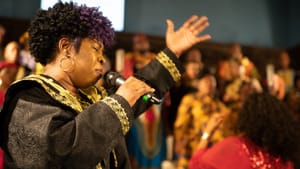Stay in the Loop
BSR publishes on a weekly schedule, with an email newsletter every Wednesday and Thursday morning. There’s no paywall, and subscribing is always free.
True catharsis
Coatesville Cultural Society presents 'The Gospel at Colonus'

For the ancient Greeks, theater was an ecstatic religious experience. Coatesville Cultural Society’s production of Lee Breuer and Bob Telson's 1983 The Gospel at Colonus reimagines Sophocles’ Oedipus at Colonus as a Pentecostal church service. As such, it is a very different kind of theater.
Led by director and People's Light & Theatre cofounder Danny Fruchter, this production is a revival of that company's 1995 version and features several of the same performers. However, while People's Light built an outdoor amphitheater and enjoyed an audience of 20,000, the Unitarian Church site is also special, since it was one of the first abolitionist congregations in the city.
Oedipus for today
Here there is no curtain speech and the lights don’t go down. Instead, while audience members finish chatting, a chorus of pure, powerful voices fills the vaulted arches of the First Unitarian Church’s sanctuary. The Preacher, played by an electric Ajene Livingston, asks those assembled to welcome each other and, with varying degrees of awkwardness, people do.
Those skeptical of peace-passing may be surprised at how quickly and how well the production builds a real feeling of community. This service is nondoctrinal. Latecomers are welcome, children are mobile, participation is encouraged. The story and the order of service are printed clearly in the program. A video screen above the stage lets you know where you are if you lose your place.
Productions of classical plays often place their value in the text’s antiquity. The implication is that we have a duty to keep alive that which has avoided being lost to time, even if by luck. The appreciation can feel more obligatory than sincere.
Pulling relevance from ancient texts, though, is the weekly work of Christian worship. In The Gospel at Colonus, the connection between ancient play and contemporary religious service isn’t forced. It’s part of a living tradition, an ongoing project of finding meaningful insight into our oldest stories. Bishop Bruce Parham (Oedipus), in a tailored grey suit with a simple burlap stole across his shoulders, brings King Oedipus out of dusty textbooks and into a breathing present.
Oedipus arrives at Colonus to die. He is a sinner and an outcast, looking for refuge in Athens. As the citizens reject Oedipus with the song “Stop; Do Not Go On,” we begin to feel the power of choral director William Reeves’s extraordinary choir. They are the fellow travelers and omniscient narrators a Greek chorus is meant to be. Paula Holloway, a standout among standouts, is a transcendent singer. Credit also goes to sound supervisor Darryl Hutchinson for allowing every soul-shaking note to be heard.

Oedipus is redeemed by Theseus (Wade Duncan), but celebrations are cut short by the arrival of Creon (Kuweka Lucas). Lucas wields a subtle, terrifying power, and the moment where he kidnaps Oedipus’s daughters is chilling. It's also a credit to Fruchter’s tight direction.
Re-centering the universal
The staging is simple but dynamic, as when Oedipus removes his sunglasses and the entire chorus shields their eyes, elegantly shifting the scene to his perspective. The only design misstep is in Ismene’s (Saundra Duncan's) costume, an exquisite white dress that makes her look more like a divinity than a daughter and detracts from the power of Oedipus’s return to the stage after his death, silent now and also dressed in white.
The Gospel at Colonus is more than the sum of its excellent parts; it’s a full-body experience. Audience members who have altar call in their cultural vocabulary leap to their feet, clapping and dancing in the aisles when Oedipus is redeemed. For those of us used to sitting quietly in the theater, something subtler takes place.
While I am skeptical of the sunny vision Fruchter lays out in his director’s notes, in which people divided by institutional privilege and disadvantage dine together at one harmonious lunch table, I believe deeply in the experience this production created.
Theseus tells Oedipus, “Your story is known everywhere, and never dies.” This is true, of course. I had to read it in high school and most likely you did too. As with so much required reading, we are asked to accept what is white and male as universally human and to fill in the gaps between the hero and ourselves. Black theatergoers often have to code-switch and can expect disapproval for not following the white rules of engagement.
The Gospel at Colonus deftly reverses this experience. In this production, black ownership of the universal is indisputable. As a result, white audience members are asked to view a story that ostensibly belongs to everyone from the position of cultural outsider. This production offers white patrons a chance to feel the mental effort it takes to clap on the two and four and still find yourself in the story.
Blessedly, in that discomfort, we are still welcome. This makes The Gospel at Colonus more than just a personal redemption; it’s also a community one.
What, When, Where
The Gospel at Colonus. By Lee Breuer and Bob Tolson, Danny Fruchter directed. Coatesville Cultural Society. Through June 10, 2018, at the First Unitarian Church, 2125 Chestnut Street, Philadelphia. (610) 384-1790 or colonusinphilly.org.
Sign up for our newsletter
All of the week's new articles, all in one place. Sign up for the free weekly BSR newsletters, and don't miss a conversation.

 Cara Blouin
Cara Blouin